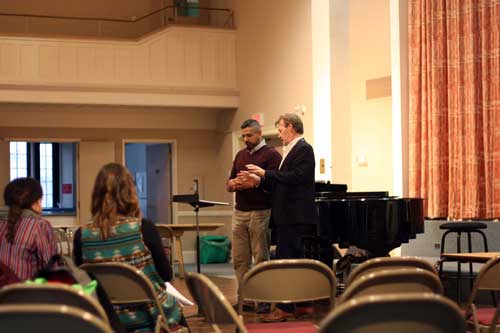As a first time choral concert-goer, I truly did not know what to expect walking into St. Paul's Basilica that Wednesday evening. I was immediately taken aback by the beauty of the church, however it was soon taking second seat to the beautiful music of the Toronto Mendelssohn Choir.
Month: March 2016
Toronto Mendelssohn Choir Soars!
David Richards, Ontario Arts Review.
Good Friday at St. Paul’s Catholic Church was the perfect day and place for a concert by the Toronto Mendelssohn Choir. The choir made wonderful use of the church’s magnificent acoustics, not to mention the elaborately decorated sanctuary. The concert of sacred music in such beautiful surroundings, on this special day, made the spirits soar. If Good Friday was meant to send a message of peace, hope and love to mankind, then the Mendelssohn Choir was an inspirational messenger.
Some Habits Are Hard to Break
Some Habits Are Hard to Break When you’ve spent your life in pursuit of excellence in choral music, the habit can be difficult to kick. Indeed, many TMC Alumni don’t want to. Alumni member Janice Schuyler Ketchen, however, has taken her choral habit to a new level, in her new home in Port Dover....
From the Executive Director’s Desk – Winter 2016
Welcome to the March issue of Voice of Mendelssohn. This month, we features stories on three individuals from our community; alumna, chorister and emerging conductor. The stories are heartwarming as they illustrate the impact that the Toronto Mendelssohn Choir has had on their lives; in one case challenging a young conductor to greater achievement, in another, sharing the gift of choral music with others, and in the third, inspiring a chorister to make a gift to inspire young composers in their creativity.
Winter 2016 in Pictures
[vc_row][vc_column][vc_column_text] Winter 2016 In Pictures During the season, we capture our activities on camera. Take a look through the slideshow below to see what we’ve been up to.[/vc_column_text][/vc_column][/vc_row][vc_row][vc_column][ultimate_carousel slider_type=”full_width” slide_to_scroll=”single” infinite_loop=”off”][vc_images_carousel images=”2068,2066,2067,2065,2061,2063,2064,2062,2060,2058,2059,2057,2056,2055,2054,2053,2052,2050,2051,2049,2041″ img_size=”500×333″][/ultimate_carousel][/vc_column][/vc_row]
The Debbie Fleming Prize for Choral Composition
When Debbie Fleming joined the TMC in 1956, she was hoping to improve her sight-singing skills. But over her 40-years in the Choir, she gained much more than that! “It wasn’t long before the incredible music that we sang, from Bach to Stravinsky, seeped into my heart and soul, and made the choir into one of the most joyful experiences of my life,” she says, ” The friends I made, the great musical moments written by the masters and singing with the Toronto Symphony were just a few of the things I loved about the TMC.”
Returning to the Classics and Conducting Under a Microscope: Camaraderie, Choral Music, and Canadian Beer
Returning to the Classics and Conducting Under a Microscope: Camaraderie, Choral Music, and Canadian Beer There comes a point in the career of a musician when the classes are over, the degrees are earned and the work becomes the inevitable focus of our professional lives. The decision to continue learning in any capacity rests solely...
Winter 2016 Voices from the Choir
At the core of the TMC community, of course, are the 132 choristers engaged in championing choral music in Canada. We talked with a couple of them about what the TMC community means to some of them, how they came to join us, and how they connect with their choir community.
Composer’s Commentary on I will lift up mine eyes
Leonard Enns writes of his TMC commission, I will lift up mine eyes: Psalm 121 is typically read, and often set musically, as a text of assurance and comfort. My setting is similar in that regard. What I find compelling, though, is the second phrase of the psalm: "from whence commeth my help (?)." Many musical settings treat the phrase "from whence cometh my help" simply as a modifier (no question mark); i.e. "... the hills from whence cometh my help" (take, for example, Mendelssohn's "Lift thine eyes"). Most current translations, however, treat it as a question.
- 1
- 2









